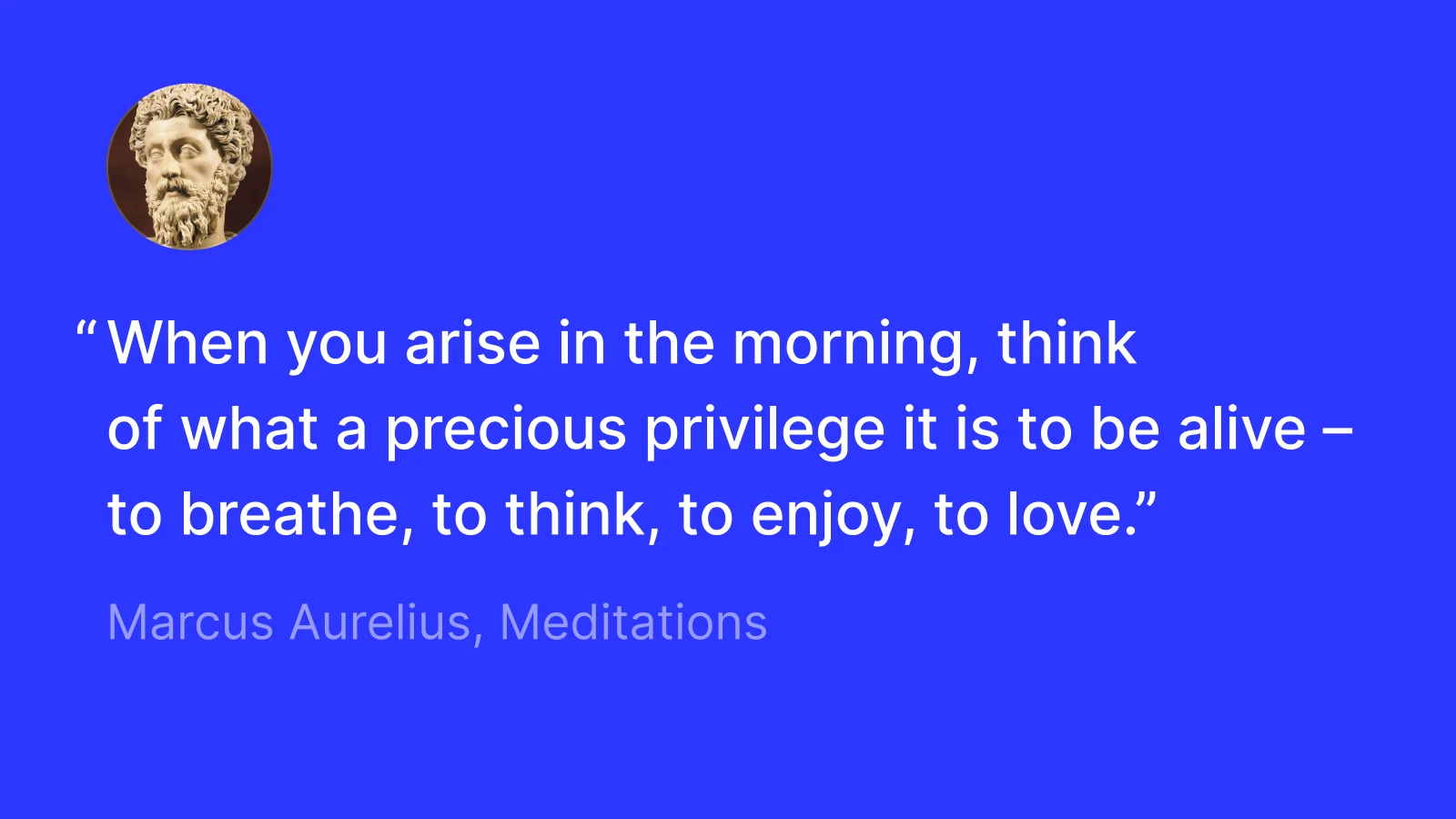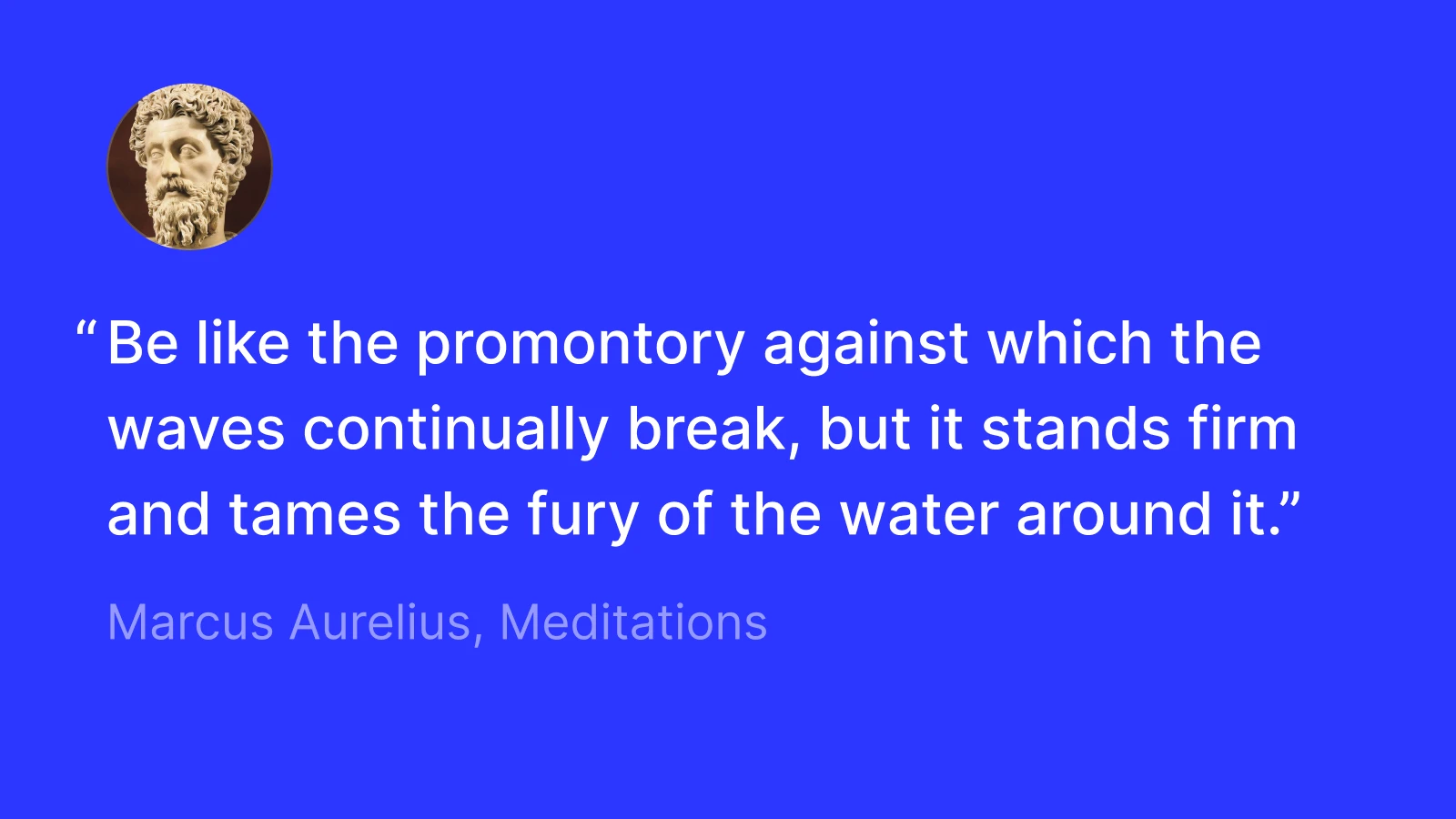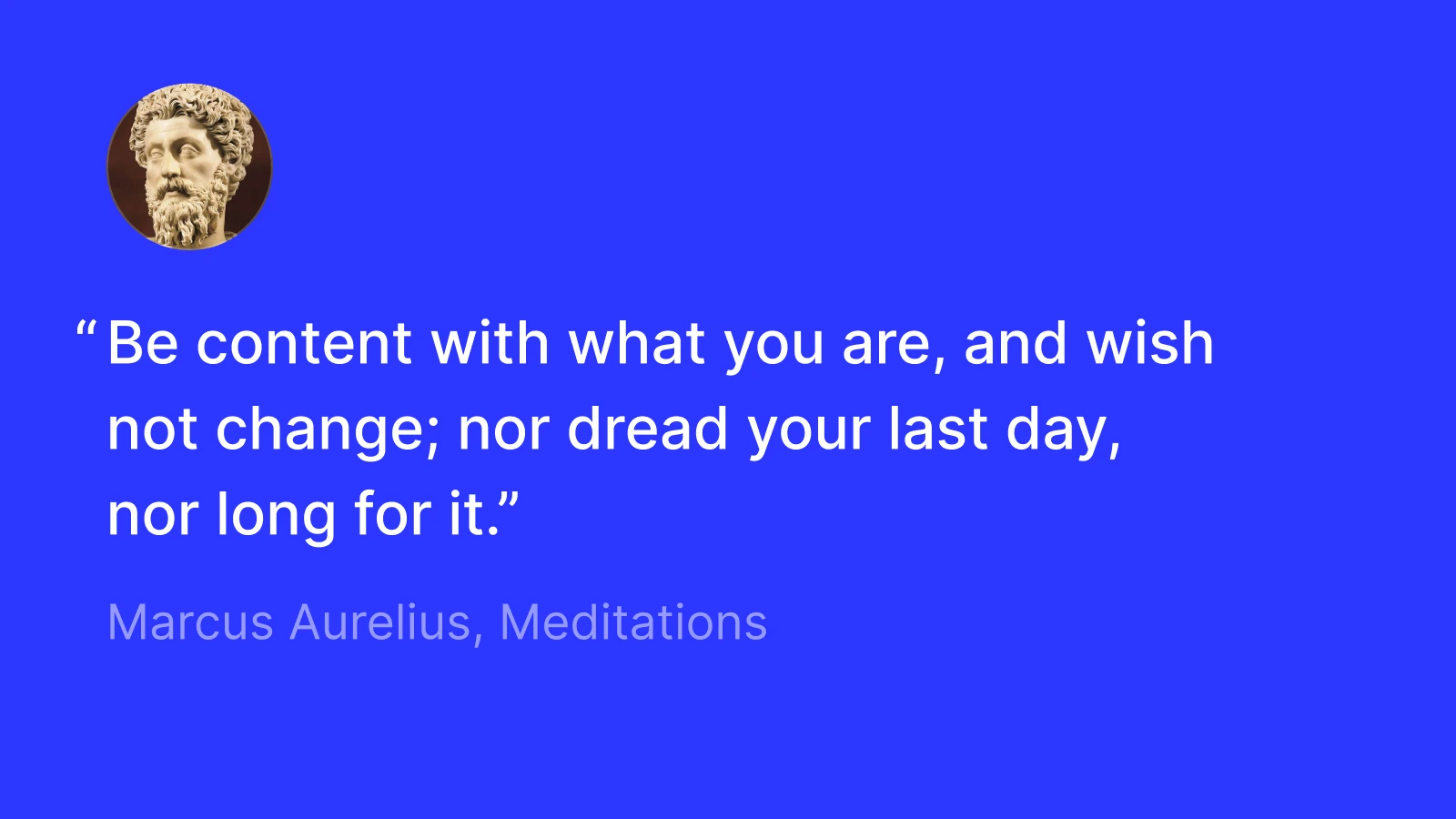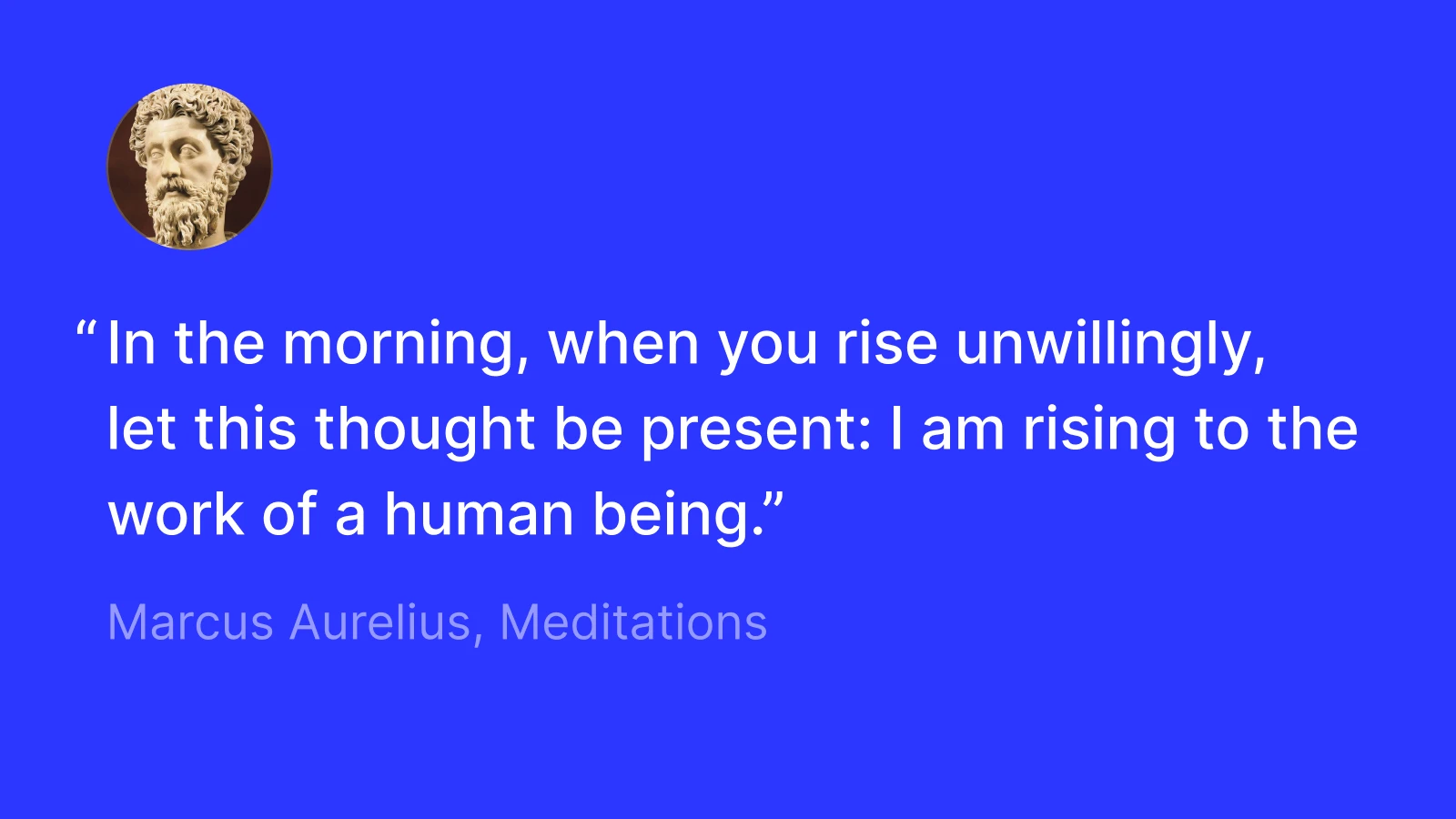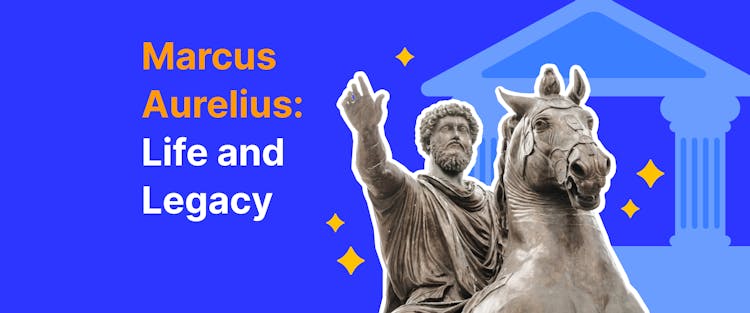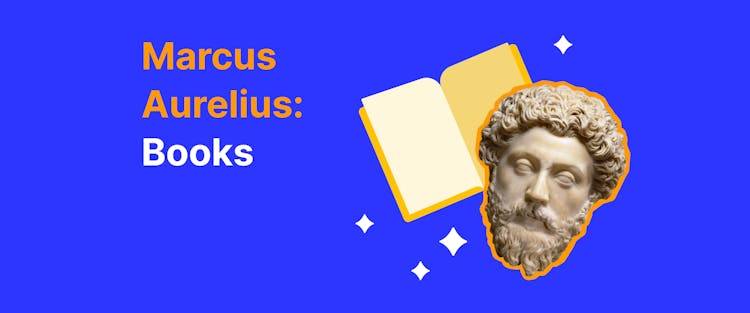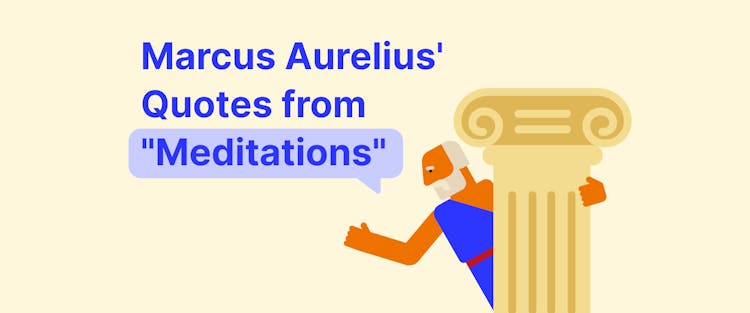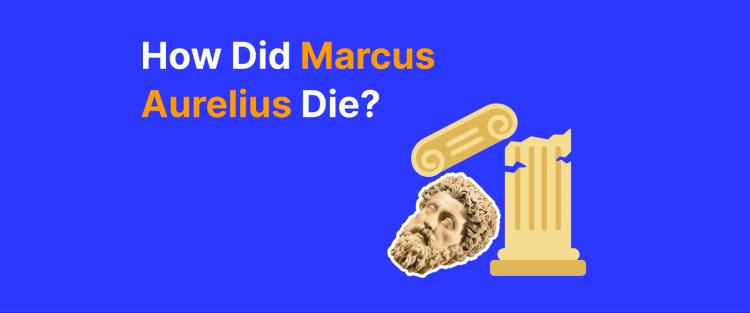"At dawn, when you have trouble getting out of bed, tell yourself: "I have to go to work—as a human being. What do I have to complain of, if I'm going to do what I was born for— the things I was brought into the world to do? Or is this what I was created for? To huddle under the blankets and stay warm?
—But it's nicer here. . . .
So you were born to feel "nice"? Instead of doing things and experiencing them? Don't you see the plants, the birds, the ants and spiders and bees going about their individual tasks, putting the world in order, as best they can? And you're not willing to do your job as a human being? Why aren't you running to do what your nature demands?
—But we have to sleep sometime. . . .
Agreed. But nature set a limit on that—as it did on eating and drinking. And you're over the limit. You've had more than enough of that. But not of working. There you're still below your quota.
You don't love yourself enough. Or you'd love your nature too, and what it demands of you. People who love what they do wear themselves down doing it, they even forget to wash or eat. Do you have less respect for your own nature than the engraver does for engraving, the dancer for the dance, the miser for money, or the social climber for status? When they're really possessed by what they do, they'd rather stop eating and sleeping than give up practicing their arts.
Is helping others less valuable to you? Not worth your effort?"
These profound words from Marcus Aurelius, the Stoic philosopher and Roman emperor, encapsulate the essence of Stoic philosophy and its practical application in daily life, particularly in the simple act of getting out of bed. We're invited to get out of bed in the morning and conquer the challenge of starting our day.
Over a thousand years ago, Marcus Aurelius shared how important it is to wake up early and start your day right. He believed that within each of us lies the power to make a positive impact on the world.
Who was Marcus Aurelius?
Roman emperor Marcus Aurelius, born in 121 AD, was one of Rome's five good emperors and a prominent Stoic philosopher. His reign was marked by notable achievements, including the successful defense of the empire against external threats, efforts to promote social and legal reforms, and a commitment to philosophical inquiry.
Despite holding immense power as the wise ruler of the Roman Empire, Aurelius was deeply influenced by Stoicism, an ancient Greek philosophy that emphasized the importance of virtue, reason, and self-control. Aurelius, known for his work "Meditations," composed private life lessons on Stoic philosophy to guide himself in life and leadership.
Aurelius' reign was marked by numerous trials, including wars and internal conflicts. However, guided by his Stoic principles, he endeavored to lead with wisdom, fairness, and compassion. Marcus Aurelius' Meditations reflect his inner thoughts and struggles, offering timeless insights into leadership, morality, and the human experience.
Marcus Aurelius' core philosophy
Waking up early is a practical application of Stoic philosophy in everyday life. By rising with the dawn, we align our actions with the natural rhythms of the universe, embracing the tranquility and potential of the early morning hours. For Stoics, this act signifies a commitment to self-discipline and purposeful living. It allows us to seize the day with clarity and intentionality, setting the tone for a productive and meaningful day ahead.
Moreover, waking up early embodies Stoic virtues such as self-control, perseverance, and mindfulness. It requires us to overcome the temptation of comfort and inertia, and instead, to prioritize our goals and responsibilities. By starting our day with purposeful action, we cultivate a sense of empowerment and agency over our lives rather than being passive recipients of circumstance.
Morning habits for personal development and self-improvement
Drawing inspiration from Marcus Aurelius' teachings, we can adopt practical morning habits to start our days with purpose and intentionality.
"The first rule is to keep an untroubled spirit. The second is to look things in the face and know them for what they are."
These words echo the importance of starting each day with a clear mind and a focused spirit. Drawing from Aurelius' timeless wisdom, let us explore practical morning rituals that can infuse our days with purpose and resilience.
1. Morning reflection.
"When you arise in the morning, think of what a precious privilege it is to be alive - to breathe, to think, to enjoy, to love."
Begin your day with a moment of quiet reflection, contemplating the blessings and challenges that lie ahead. Embrace the Stoic practice of introspection, using journaling or meditation to gain clarity and insight into your thoughts and intentions for the day.
2. Set an intention for the day.
"Begin each day by telling yourself: Today I shall be meeting with interference, ingratitude, insolence, disloyalty, ill-will, and selfishness – all of them due to the offender's ignorance of what is good or evil."
Inspired by Aurelius' teachings on resilience, set a clear intention for your morning. Choose one virtue or goal to focus on, whether it's practicing patience, cultivating kindness, or pursuing personal growth. Setting a morning intention aligns your actions with your values and guides you through the day's challenges.
3. Practice mindful movement.
"Be like the promontory against which the waves continually break, but it stands firm and tames the fury of the water around it."
Incorporate mindful movement into your morning routine, as Aurelius believed in the importance of maintaining physical health and well-being. Engage in activities like stretching, walking, or yoga to awaken your body and center your mind. Use this time to connect with your breath, grounding yourself in the present moment.
4. Limit morning distractions.
"The best revenge is to be unlike him who performed the injury."
Resist the urge to start your day with distractions like scrolling through social media or checking emails. Instead, focus on activities that promote mental clarity and focus, such as reading, journaling, or enjoying a leisurely breakfast. By minimizing distractions, you create space for introspection and self-awareness, laying the foundation for a productive and fulfilling day.
5. Express gratitude.
"Be content with what you are, and wish not change; nor dread your last day, nor long for it."
Before diving into your daily tasks, take a moment to express gratitude for the blessings in your life. Reflect on Aurelius' words and acknowledge the privilege of being alive. Cultivate an attitude of gratitude by writing down three things you are thankful for each morning, fostering a sense of abundance and joy in your heart.
6. Consistency.
"If you don't have a consistent goal in life, you can't live it in a consistent way."
Marcus Aurelius understood the importance of regularity and steadfastness in achieving our goals. To maintain consistency, establish daily routines and habits that align with your values and objectives. Whether it's dedicating time to exercise, practicing a skill, or engaging in acts of self-care, make a commitment to show up every day, even when faced with obstacles or distractions. By staying consistent, you build momentum and progress towards your goals steadily over time.
"In the morning, when you rise unwillingly, let this thought be present: I am rising to the work of a human being."
With these words, Marcus Aurelius reminds us of the noble purpose that awaits us each time we think about how to get out of bed. By incorporating practical morning rituals inspired by Aurelius' wisdom, we can greet each new day with clarity, resilience, and gratitude.
Marcus Aurelius' inspirational quotes
These quotes aren't just ancient words; they're timeless reminders of what it means to be human. From advice on finding inner peace to reflections on life's impermanence, Marcus Aurelius' words have the power to inspire and guide us through our own journeys.
"You have power over your mind - not outside events. Realize this, and you will find strength."
"Dwell on the beauty of life. Watch the stars, and see yourself running with them."
"The happiness of your life depends upon the quality of your thoughts."
"Everything we hear is an opinion, not a fact. Everything we see is a perspective, not the truth."
"If you are distressed by anything external, the pain is not due to the thing itself, but to your estimate of it; and this you have the power to revoke at any moment."
"Never let the future disturb you. You will meet it, if you have to, with the same weapons of reason which today arm you against the present."
Transform your mornings with Headway
Incorporating Marcus Aurelius' timeless wisdom into our morning routines can transform our lives, guiding us toward greater fulfillment and inner peace. By embracing the principles of Stoic philosophy, we can navigate life's challenges with grace and wisdom, fulfilling our potential as rational and virtuous human beings. As Aurelius reminds us, "Waste no more time arguing about what a good man should be. Be one."
To further explore Marcus Aurelius' "Meditations," his teachings, and their practical applications, dive into the book summary available on the Headway app. Here, you'll find a wealth of insights to deepen your understanding and embark on your journey toward personal growth and self-mastery.



